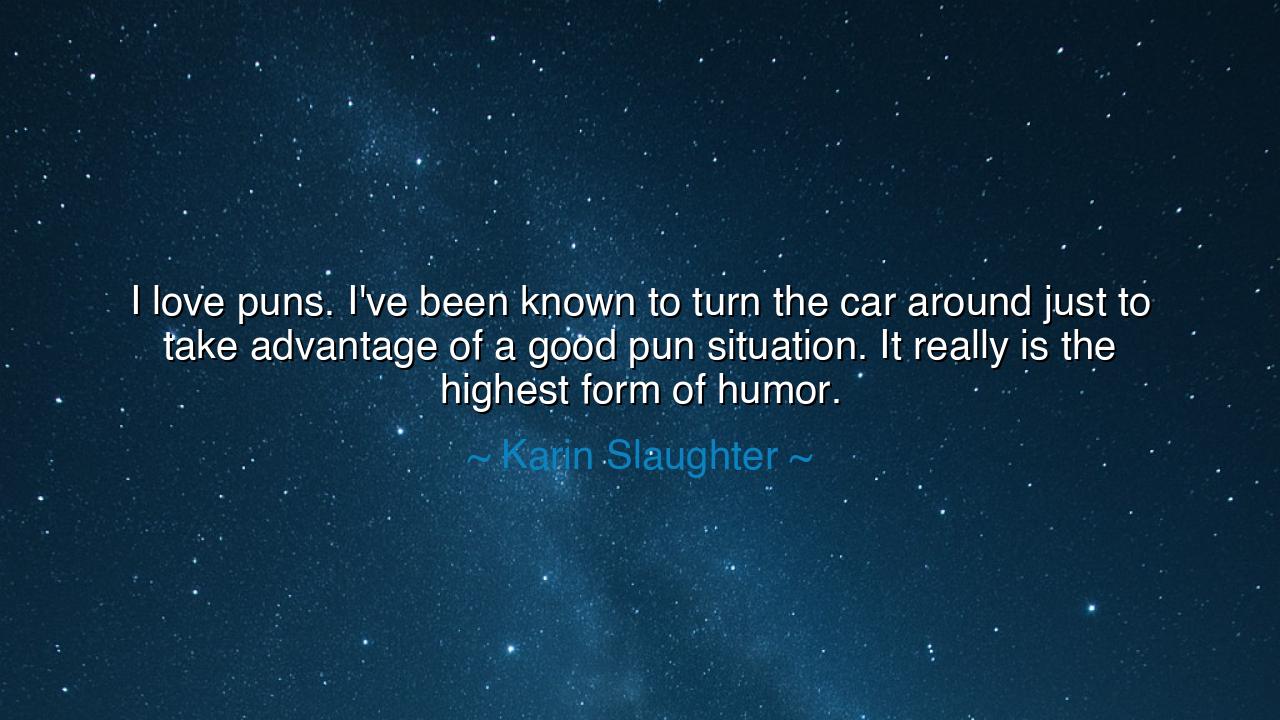
I love puns. I've been known to turn the car around just to take
I love puns. I've been known to turn the car around just to take advantage of a good pun situation. It really is the highest form of humor.






There is a peculiar genius in the art of laughter, and among its many forms, one shines with both wit and wisdom — the pun. When Karin Slaughter declared, “I love puns. I’ve been known to turn the car around just to take advantage of a good pun situation. It really is the highest form of humor,” she was not merely jesting. Beneath her words lies a truth both ancient and delightful: that language itself is a living creature, and those who play with it understand its secret spirit. To craft a pun is not to speak lightly, but to see deeply — to perceive the hidden pathways between words, where meaning and mischief dance together like twin flames.
The origin of this thought reaches far back into the heart of civilization itself. The ancients, too, delighted in the clever turn of phrase. The Greeks called it paronomasia — the art of wordplay — and even the philosophers, stern and solemn as they seemed, could not resist its charm. Socrates, when accused of corrupting the youth, jested that the true corruption was ignorance, for it turns “golden souls into brass.” And in Rome, Cicero, master of oratory, used puns to slice through arrogance with the precision of a blade. To them, and to those like Slaughter, humor was not mere amusement, but a form of intelligence — the ability to see two truths at once, to hold double meanings in the mind without confusion, but with joy.
To love puns, as Slaughter does, is to honor the playfulness of the mind. For in every pun there is a small act of rebellion — a refusal to let words be rigid, a reminder that language, like life, is meant to move, to shift, to surprise. The punster walks between order and chaos: twisting meaning just enough to reveal something hidden, yet not enough to lose the thread of understanding. It is the laughter of the philosopher and the poet alike — laughter born from perception, not from folly. That is why she calls it the “highest form of humor”: it demands both intellect and imagination, a nimbleness of spirit that sees light even in logic.
History offers us examples of those who, through wordplay, softened the hardest hearts. Consider Abraham Lincoln, a man burdened by the sorrows of war, who nonetheless wielded humor as both shield and balm. When accused of being two-faced, he famously replied, “If I were two-faced, would I be wearing this one?” In that moment, laughter disarmed hostility; wit turned tension into grace. His pun was more than jest — it was wisdom clothed in humor, revealing truth without cruelty. And so it is with all great wordplay: it lightens without diminishing, it teaches without preaching, it heals without wounding.
There is, too, a spiritual lesson in the love of puns. For to find joy in the play of words is to remain forever childlike in wonder. The child does not see language as a chain but as clay, to be shaped and reshaped with laughter. Slaughter’s confession — that she would “turn the car around” for a good pun — is an act of devotion, not to comedy alone, but to the beauty of noticing. It is the mark of a soul unwilling to rush past joy, one who understands that a small cleverness, well-timed, can make the world brighter for a moment. Those who pause to play with words are those who have not forgotten how to marvel at the simple gift of expression.
In a world so often weighed down by solemnity, humor becomes a kind of rebellion against despair. The pun reminds us that even in language — that most serious of human tools — there is room for laughter, for levity, for grace. When two meanings meet and spark laughter, we glimpse the divine irony of life itself: that truth is often best revealed through delight. The pun, therefore, is not trivial — it is the alchemy of thought, turning intellect into joy, and communication into connection.
So, my child, remember this lesson from the ancients and from Slaughter alike: do not scorn the humble pun, nor the laughter it brings. It is a sign of a nimble mind and a joyful heart. Let your words dance as your thoughts do; find pleasure in their music and their mischief. When the chance for laughter appears, do not let it pass you by — even if you must turn the car around to catch it. For in that small act, you honor not only humor, but life itself: ever playful, ever profound, ever filled with meaning hiding just beneath the sound of a smile.






AAdministratorAdministrator
Welcome, honored guests. Please leave a comment, we will respond soon